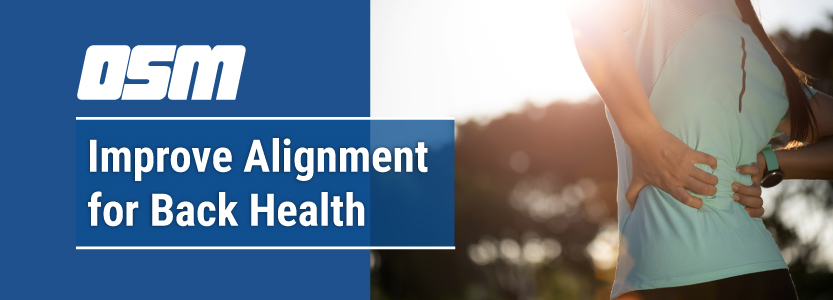Posture Perfect: Improving Alignment for Back Health
Article featured on Orthopaedic Associates
In our busy lives, we often forget the significance of good posture. Did you know that maintaining proper alignment can have a profound impact on your spinal health and overall quality of life?
In this article, we will explore the importance of posture and how you can work toward having better posture for a healthier you.
The Importance of Good Posture
Good posture does more than just keep you looking confident. It ensures that your body functions optimally by:
- Reducing the risk of pain and injuries.
- Improving breathing.
- Aiding digestion.
When it comes to back health, posture plays a pivotal role. A well-aligned spine reduces stress on muscles and ligaments, decreasing the risk of chronic pain and degenerative diseases.
Steps to Improve Posture
Improving your posture is a proactive approach to maintaining a healthy back and overall well-being. Here are steps you can take to enhance your posture:
1. Awareness and Identification
The first step to better posture is self-awareness. Pay attention to how you sit, stand, and move throughout the day and identify any habits that contribute to poor posture. This may include:
- Slouching
- Hunching over devices
- Leaning to one side while sitting
2. Regular Posture Checks
Set reminders to check your posture regularly, especially if you have a desk job or spend hours on a computer. Ensure that:
- Your shoulders are relaxed.
- Your spine is aligned.
- Your feet are flat on the floor.
Making these adjustments a habit can significantly improve your posture over time.
3. Core Strengthening
Maintaining a strong core is an essential component of good posture. Incorporate core-strengthening exercises into your fitness routine. Planks, bridges, and leg raises are all effective exercises that target the muscles supporting your spine.
4. Stretching Exercises
Stretching helps alleviate muscle tension and promotes flexibility. Focus on stretching your:
- Chest
- Shoulders
- Hip flexors
- Hamstrings
These stretches can counteract the effects of prolonged sitting and contribute to better posture.
5. Proper Ergonomics
If you have a desk job, make sure that your workspace is ergonomic. Level your chair, desk, and laptop or computer monitor to promote good posture. You should ensure that your chair supports your lower back and that your screen is at eye level to reduce strain on your neck.
6. Posture-Friendly Furniture
Invest in furniture that encourages good posture. Supportive chairs with lumbar support, ergonomic pillows, and standing desks can all contribute to maintaining proper alignment.
7. Mindful Sitting and Standing
Be mindful of your posture while you are sitting or standing. Imagine a string pulling the top of your head toward the ceiling to help you sit or stand tall. You should also distribute your body weight evenly between both feet when standing to prevent favoring one side.
8. Use Props
Consider using props, like cushions or lumbar rolls, to maintain correct spinal alignment while sitting. These props can help you maintain the natural curve of your lower back.
9. Regular Breaks
Don’t forget to pause and rest frequently throughout the day, particularly when your work involves minimal movement. Take a moment to stand up, stretch out your muscles, and walk around every hour. This can ward off tight muscles and encourage healthier posture.
10. Consult a Professional
If you are struggling with posture issues or experiencing persistent back pain, consult a healthcare provider or physical therapist. They can provide personalized guidance, exercises, and therapies to address your specific posture-related concerns.
By incorporating these steps into your daily routine and being mindful of your posture, you can make significant progress toward achieving better alignment and a healthier back.
When to Seek Medical Attention for Back Pain
While self-care can help with back pain, certain signs warrant a visit to a healthcare provider. Common signs you should seek medical attention for your back pain include:
- Persistent or Severe Pain: If back pain persists or worsens over weeks, consult a doctor.
- Leg Pain and Numbness: Pain radiating down the leg with numbness or weakness may signal nerve issues.
- Recent Trauma: After an accident or injury, get a medical evaluation to rule out serious damage.
- Loss of Bladder or Bowel Control: Sudden loss of control requires immediate medical attention.
- Unexplained Weight Loss: Weight loss with back pain may indicate underlying health problems.
- History of Cancer: Back pain in cancer survivors should be discussed with a healthcare provider.
- Fever or Infection Symptoms: Back pain with fever or signs of infection needs medical assessment.
- Difficulty Walking: If back pain impairs walking or causes leg weakness, consult a doctor.
- Previous Spinal Surgery: Post-surgery pain changes should be discussed with your surgeon.
In these cases, seeking medical advice is essential for a thorough evaluation and appropriate treatment.
Remember, early detection and intervention can lead to better outcomes for back pain and related conditions.
The Orthopedic & Sports Medicine Center of Oregon is an award-winning, board-certified orthopedic group located in downtown Portland Oregon. We utilize both surgical and nonsurgical means to treat musculoskeletal trauma, spine diseases, foot and ankle conditions, sports injuries, degenerative diseases, infections, tumors and congenital disorders.
Our mission is to return our patients back to pain-free mobility and full strength as quickly and painlessly as possible using both surgical and non-surgical orthopedic procedures.
Our expert physicians provide leading-edge, comprehensive care in the diagnosis and treatment of orthopedic conditions, including total joint replacement and sports medicine. We apply the latest state-of-the-art techniques in order to return our patients to their active lifestyle.
If you’re looking for compassionate, expert orthopedic and podiatric surgeons in Portland Oregon, contact OSM today.
Phone:
Address
17355 Lower Boones Ferry Rd Suite 100A
Lake Oswego, OR 97035
Hours
Monday–Friday
8:00am – 4:30pm



